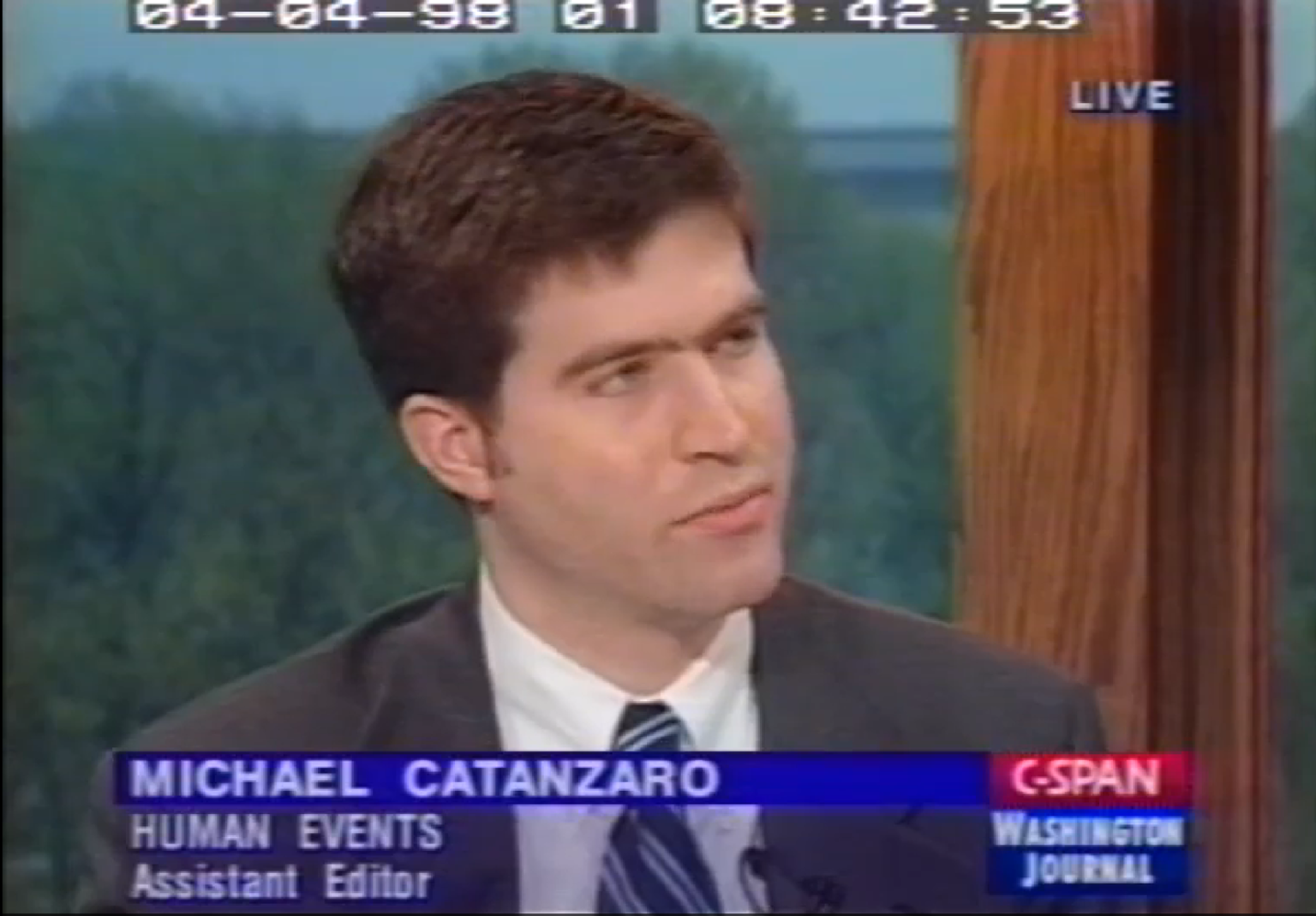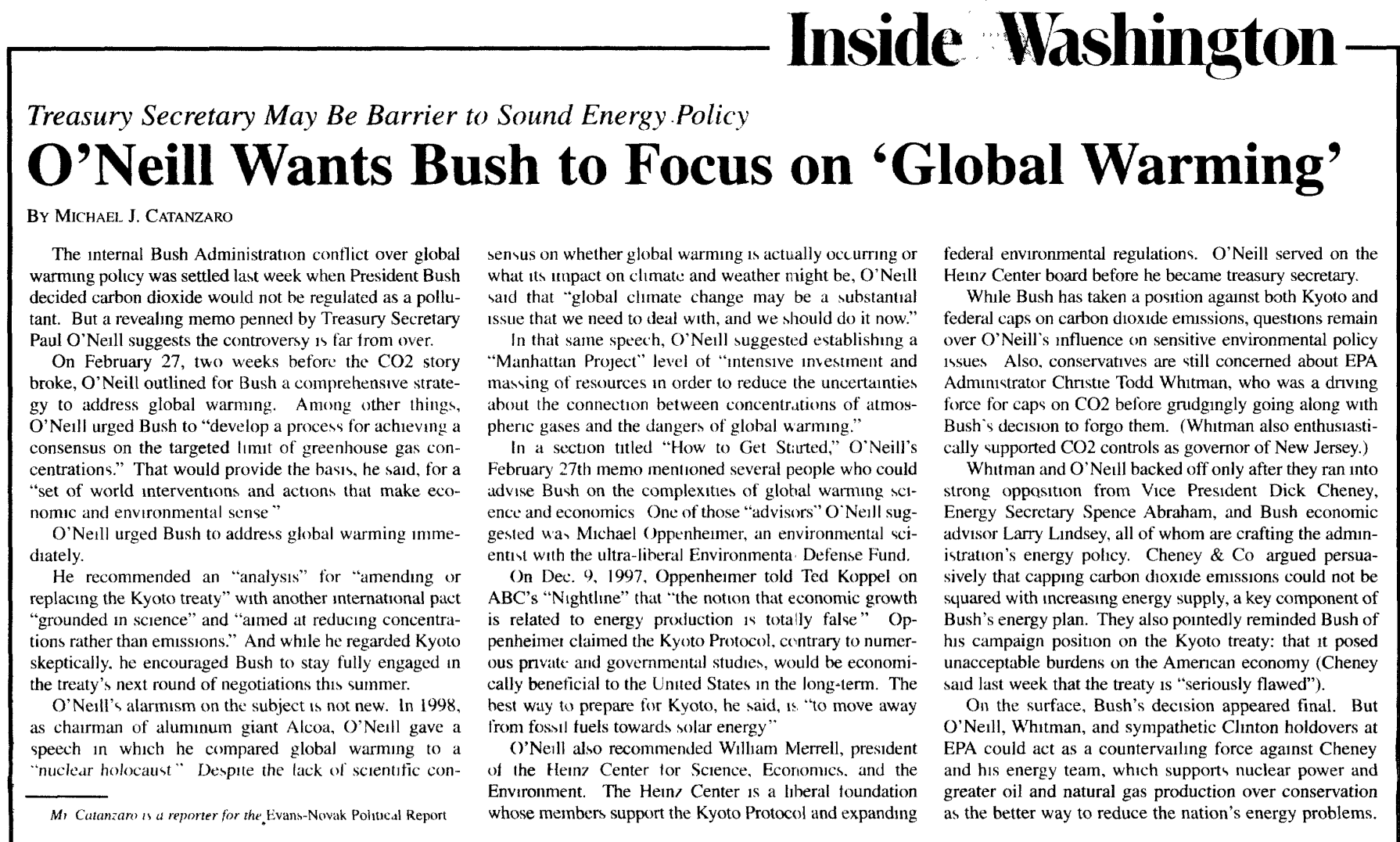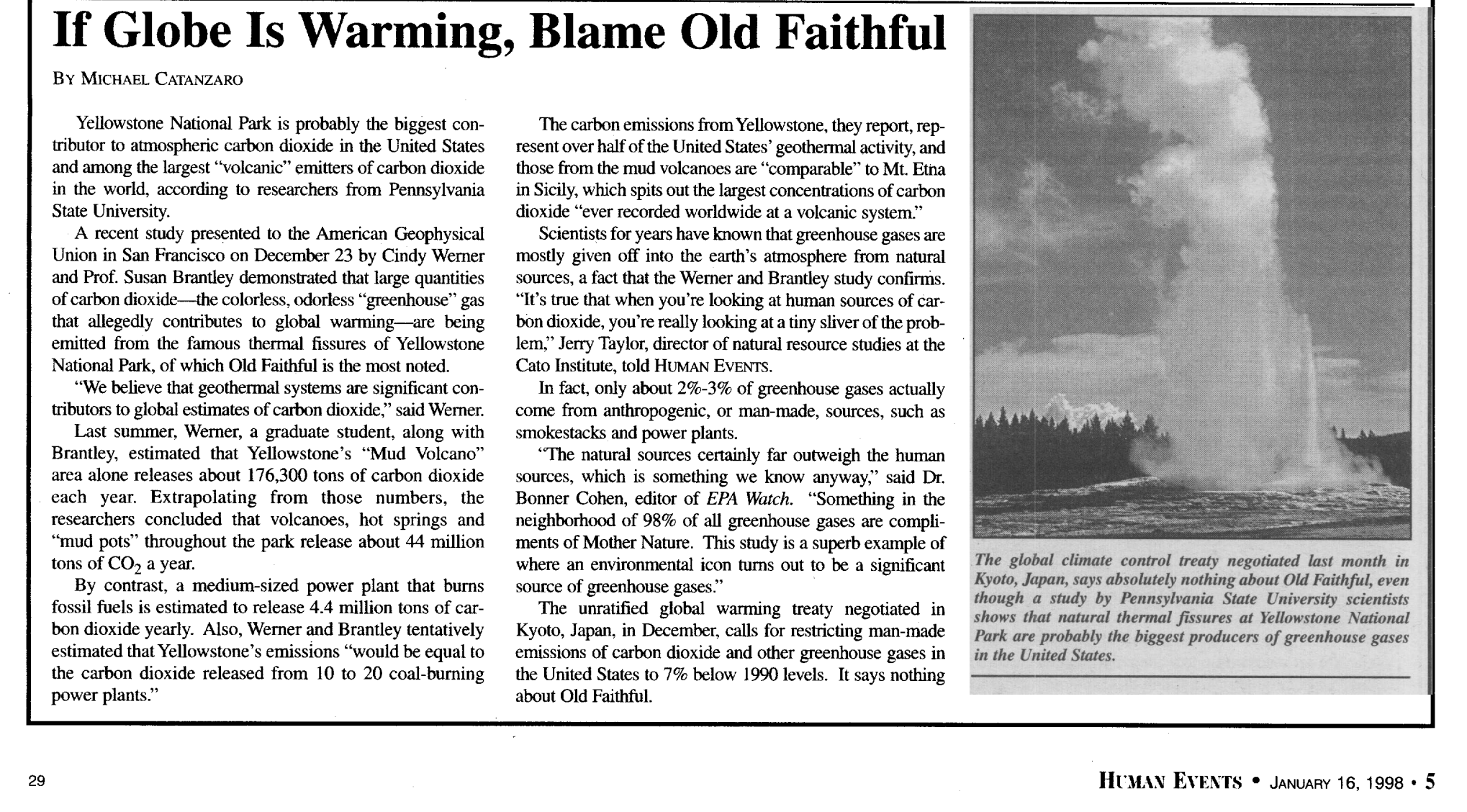Mike Catanzaro, President Donald Trump’s recently minted top energy aide, has officially begun his first week on the job at the White House. He was hired to move policy measures through federal energy and environmental agencies in a synergistic way.
A long-time oil and gas industry lobbyist who has spent his career passing in and out of the government-industry revolving door, Catanzaro actually got his start as a writer. Working for the conservative newspapers Human Events and Evans-Novak Political Report, Catanzaro’s views on climate change — and climate denial — were on full display in articles published during his formative years as an up-and-coming conservative star.
DeSmog has reviewed articles found in the Human Events archives, no longer found on the publication’s website, and they shed new light on Catanzaro and his views as Trump’s right-hand man on climate, energy, and environmental policy.
Catanzaro’s articles, obtained through the University of Wisconsin Libraries System, purport that mainstream U.S. environmental groups are driven by Marxist ideology and that global warming is a “liberal concept” (as opposed to a scientific reality). They also reveal him writing puff pieces on organizations such as the climate change-denying Heartland Institute and individuals such as prominent climate denier Fred Singer.
“Alarmism”
In March 2001, Catanzaro wrote an article titled “Energy Secretary May Be Barrier to Sound Energy Policy” about then-President George W. Bush’s U.S. Treasury Secretary, Paul O’Neill, which covered O’Neill’s views on what he referred to as “global warming” (in scare quotes). Catanzaro found O’Neill’s posture on climate problematic, as O’Neill wanted the Bush administration’s policy to be “grounded in science.”
Image Credit: Human Events; University of Wisconsin-Madison Libraries
Citing O’Neill’s “alarmism,” Catanzaro wrote that there is a “lack of consensus on whether global warming is occurring or what its impact on climate and weather might be.” Yet that same year, the United Nations Intergovernmental Panel on Climate Change (IPCC) released its more than 1,000 page assessment, assembled and reviewed by hundreds of scientists, cataloging evidence for exactly such a scientific consensus that humans are changing the climate and some of the resulting impacts.
“Natural and human systems are expected to be exposed to climatic variations such as changes in the average, range, and variability of temperature and precipitation, as well as the frequency and severity of weather events,” wrote the IPCC. “Systems also would be exposed to indirect effects from climate change such as sea level rise, soil moisture changes, changes in land and water condition, changes in the frequency of fire and pest infestation, and changes in the distribution of infectious disease vectors and hosts.”
“Good Things Usually Happen”
In a 1997 profile of the Heartland Institute, one of the pioneering nodes of the climate change denial and anti-environmental machine, Catanzaro described the free-market think tank as a place where “good things usually happen.”
“The most important subject the institute is dealing with right now is environmentalism,” he wrote. “Of particular interest … is global warming and Heartland has been ahead of the curve in unraveling some of the confusions and obfuscations spewed by left-wing environmentalists on that very issue.”
Though funded by wealthy donors and corporations including ExxonMobil, Catanzaro wrote that “Heartland remains a testament to the power and influence of the grassroots.”
Catanzaro would, later in his career, become a lobbyist for Koch Industries and other companies such as Noble Energy, Devon Energy, Encana Oil and Gas, American Fuel and Petrochemical Manufacturers (AFPM), and Hess Corporation. The Koch network has led the way in funding climate denial in recent years and has used “astroturf” techniques, or seemingly grassroots movements which are in reality fronts for corporate interests.
“Blame Yellowstone”
In January 1998, Catanzaro penned an article about naturally occurring greenhouse gas emissions emanating from Yellowstone National Park’s geysers. Pointing to a study published in December 1997, his piece was titled, “If the World is Warming, Blame Old Faithful.”
Image Credit: Human Events, University of Wisconsin-Madison Libraries
The study he cited said that Yellowstone’s geothermal features emit 4.4 million tons of carbon dioxide per year, the equivalent of about 10 medium-sized coal-fired power plants. Even with coal-fired power plants in decline in the U.S. today, there are still 363 plants open for business and located in the U.S., according to U.S. Energy Information Administration data. That would be the greenhouse gas equivalent of 36 Yellowstones, according to the study cited by Catanzaro.
But he extends his argument further, also stating that “only about 2%-3% of greenhouse gases actually come from anthropogenic, or man-made, sources, such as smokestacks or power plants.” Yet a 2011 study says that at least 74 percent of global warming can be linked directly to human activity.
“It is thus extremely likely (>95% probability) that the greenhouse gas induced warming since the mid-twentieth century was larger than the observed rise in global average temperatures, and extremely likely that anthropogenic forcings were by far the dominant cause of warming,” explains that 2011 study published in the journal Nature Geoscience. “The natural forcing contribution since 1950 is near zero.”
Catanzaro’s Human Events article also quotes Bonner Cohen, a long-time climate change denier who ran the publication EPA Watch, as an expert on the issue of naturally occurring climate change.
Anti-Kyoto Climate Deal
As a candidate, Trump pledged to “cancel” the United Nations Paris climate deal and “stop all payments of U.S. tax dollars to U.N. global warming programs.” Based on his top energy aide’s early writings at Human Events, it appears President Trump has hired a comrade-in-arms for the cause.
“The Clinton Administration has launched an all-out propaganda campaign to facilitate passage of a United Nations-sponsored global-warming treaty that, if ratified, could wreck havoc on middle-class American families while allowing major polluters such as Communist China and India to escape the treaty’s restrictions on so-called ‘greenhouse’ gas emissions,” Catanzaro wrote in 1997 his article, ”Clinton Launches Propaganda Campaign for Global-Warming Treaty.”
“Worse, there is no scientific consensus that global warming is indeed taking place — the reason Clinton has mounted a massive propaganda campaign,” he opined.
In that same article, Catanzaro also referred to climate change as a “religious belief,” while quoting prominent climate deniers such as Fred Singer to make his case. Catanzaro also wrote a profile piece on Singer in November 1997, in which he juxtaposed Singer with other scientists whom he said were guilty of “using pseudo-scientific postulates to scare the public into accepting the disastrous international global-climate treaty that will be debated in Kyoto, Japan, next month.”
“Contrary to what [global-warming proponents] say, there is no global warming,” Singer told Catanzaro for that article. “And contrary to what [those proponents] say, there is no scientific consensus either.”
“No Connection” vs. 97%
Though he’d eventually leave the writing world to work for the Senate Environment and Public Works Committee, which was then chaired by infamous climate denier Sen. James Inhofe (R-OK), Catanzaro continued to write on the side for Human Events until landing a policy job in the Bush White House’s Council on Environmental Quality (CEQ). During that time, he wrote articles such as “Glaciers, ‘Global Warming,’ and NY Times Hysteria,” “Be Afraid!!! Global Warming and Malaria,” “More Leftist Enviro Scare Tactics,” and “No Global Warming Consensus.”
Catanzaro has also written that “there is no connection between global warming and extreme weather,” as well as “when it comes to the science of global warming, the alarmists, of course, think all the complexities and uncertainties have been settled.” Meanwhile, 97 percent of peer-reviewed scientific studies on climate change have concluded that climate change is caused by humans.
Catanzaro’s publishing history has surfaced at the same time sea ice levels have hit record lows at both poles. Scientists peg this trend to human-caused climate change, which has contributed to weather patterns such as the “Polar Vortex.”
“Greenhouse gases emitted through human activities and the resulting increase in global mean temperatures are the most likely underlying cause of the sea ice decline,” wrote the National Snow and Ice Data Center, which is based at the University of Colorado and funded by NASA, the National Science Foundation (NSF), the National Oceanic and Atmospheric Administration (NOAA).
When Alex Formuzis, Vice President of Communications for the Environmental Working Group (EWG), viewed some of Catanzaro’s past writings, he pointed to Catanzaro as part of a broader trend among Trump’s energy, environment, and climate team.
“Tapping Mr. Catanzaro as a White House energy advisor fits with President Trump’s agenda of promoting the interests of fossil fuel industry over the environment and public health,” Formuzis told DeSmog. “Catanzaro has a long history as a lobbyist for many of the same companies that had significant influence over EPA administrator Scott Pruitt when he was attorney general of Oklahoma.”
Catanzaro did not return DeSmog’s request for comment.
Research contributed by A.C. Tyler.
Image Credit: C-SPAN Screenshot
Subscribe to our newsletter
Stay up to date with DeSmog news and alerts








